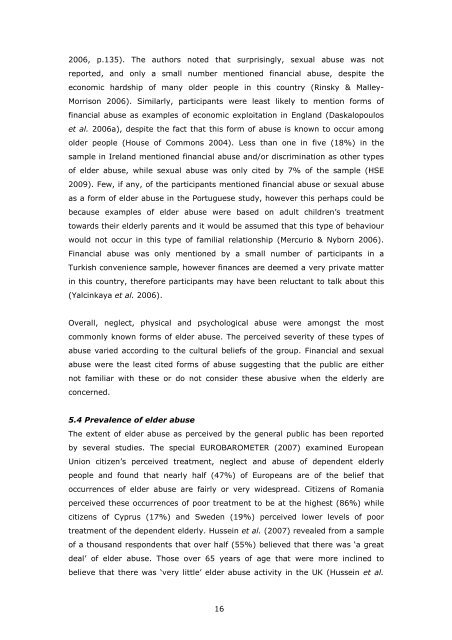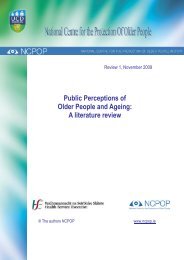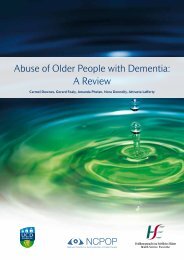Public Perceptions of Elder Abuse - Global Action on Aging
Public Perceptions of Elder Abuse - Global Action on Aging
Public Perceptions of Elder Abuse - Global Action on Aging
You also want an ePaper? Increase the reach of your titles
YUMPU automatically turns print PDFs into web optimized ePapers that Google loves.
2006, p.135). The authors noted that surprisingly, sexual abuse was not<br />
reported, and <strong>on</strong>ly a small number menti<strong>on</strong>ed financial abuse, despite the<br />
ec<strong>on</strong>omic hardship <str<strong>on</strong>g>of</str<strong>on</strong>g> many older people in this country (Rinsky & Malley-<br />
Morris<strong>on</strong> 2006). Similarly, participants were least likely to menti<strong>on</strong> forms <str<strong>on</strong>g>of</str<strong>on</strong>g><br />
financial abuse as examples <str<strong>on</strong>g>of</str<strong>on</strong>g> ec<strong>on</strong>omic exploitati<strong>on</strong> in England (Daskalopoulos<br />
et al. 2006a), despite the fact that this form <str<strong>on</strong>g>of</str<strong>on</strong>g> abuse is known to occur am<strong>on</strong>g<br />
older people (House <str<strong>on</strong>g>of</str<strong>on</strong>g> Comm<strong>on</strong>s 2004). Less than <strong>on</strong>e in five (18%) in the<br />
sample in Ireland menti<strong>on</strong>ed financial abuse and/or discriminati<strong>on</strong> as other types<br />
<str<strong>on</strong>g>of</str<strong>on</strong>g> elder abuse, while sexual abuse was <strong>on</strong>ly cited by 7% <str<strong>on</strong>g>of</str<strong>on</strong>g> the sample (HSE<br />
2009). Few, if any, <str<strong>on</strong>g>of</str<strong>on</strong>g> the participants menti<strong>on</strong>ed financial abuse or sexual abuse<br />
as a form <str<strong>on</strong>g>of</str<strong>on</strong>g> elder abuse in the Portuguese study, however this perhaps could be<br />
because examples <str<strong>on</strong>g>of</str<strong>on</strong>g> elder abuse were based <strong>on</strong> adult children’s treatment<br />
towards their elderly parents and it would be assumed that this type <str<strong>on</strong>g>of</str<strong>on</strong>g> behaviour<br />
would not occur in this type <str<strong>on</strong>g>of</str<strong>on</strong>g> familial relati<strong>on</strong>ship (Mercurio & Nyborn 2006).<br />
Financial abuse was <strong>on</strong>ly menti<strong>on</strong>ed by a small number <str<strong>on</strong>g>of</str<strong>on</strong>g> participants in a<br />
Turkish c<strong>on</strong>venience sample, however finances are deemed a very private matter<br />
in this country, therefore participants may have been reluctant to talk about this<br />
(Yalcinkaya et al. 2006).<br />
Overall, neglect, physical and psychological abuse were am<strong>on</strong>gst the most<br />
comm<strong>on</strong>ly known forms <str<strong>on</strong>g>of</str<strong>on</strong>g> elder abuse. The perceived severity <str<strong>on</strong>g>of</str<strong>on</strong>g> these types <str<strong>on</strong>g>of</str<strong>on</strong>g><br />
abuse varied according to the cultural beliefs <str<strong>on</strong>g>of</str<strong>on</strong>g> the group. Financial and sexual<br />
abuse were the least cited forms <str<strong>on</strong>g>of</str<strong>on</strong>g> abuse suggesting that the public are either<br />
not familiar with these or do not c<strong>on</strong>sider these abusive when the elderly are<br />
c<strong>on</strong>cerned.<br />
5.4 Prevalence <str<strong>on</strong>g>of</str<strong>on</strong>g> elder abuse<br />
The extent <str<strong>on</strong>g>of</str<strong>on</strong>g> elder abuse as perceived by the general public has been reported<br />
by several studies. The special EUROBAROMETER (2007) examined European<br />
Uni<strong>on</strong> citizen’s perceived treatment, neglect and abuse <str<strong>on</strong>g>of</str<strong>on</strong>g> dependent elderly<br />
people and found that nearly half (47%) <str<strong>on</strong>g>of</str<strong>on</strong>g> Europeans are <str<strong>on</strong>g>of</str<strong>on</strong>g> the belief that<br />
occurrences <str<strong>on</strong>g>of</str<strong>on</strong>g> elder abuse are fairly or very widespread. Citizens <str<strong>on</strong>g>of</str<strong>on</strong>g> Romania<br />
perceived these occurrences <str<strong>on</strong>g>of</str<strong>on</strong>g> poor treatment to be at the highest (86%) while<br />
citizens <str<strong>on</strong>g>of</str<strong>on</strong>g> Cyprus (17%) and Sweden (19%) perceived lower levels <str<strong>on</strong>g>of</str<strong>on</strong>g> poor<br />
treatment <str<strong>on</strong>g>of</str<strong>on</strong>g> the dependent elderly. Hussein et al. (2007) revealed from a sample<br />
<str<strong>on</strong>g>of</str<strong>on</strong>g> a thousand resp<strong>on</strong>dents that over half (55%) believed that there was ‘a great<br />
deal’ <str<strong>on</strong>g>of</str<strong>on</strong>g> elder abuse. Those over 65 years <str<strong>on</strong>g>of</str<strong>on</strong>g> age that were more inclined to<br />
believe that there was ‘very little’ elder abuse activity in the UK (Hussein et al.<br />
16









